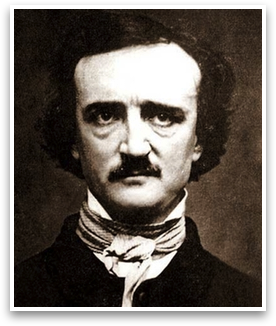
Edgar Allan Poe
Upon his death, Edgar Allan Poe's literary executor, Rufus Griswold, noted in his obituary that few would be grieved by Poe's death because he had "few or no friends," but he could not deny that Poe was a "brilliant" if not "erratic" genius.
Despite the unfair damage Griswold also did to Poe's reputation (Poe was neither a drug addict nor a drunkard), he at least properly characterizes Poe's literary legacy. For all of his problems (and he did have a few), Poe left a broad literary legacy that few can match, offering equal excellence in the essay, poetry, short story, and literary criticism.

Themes and Facts
- Abandoned and orphaned at an early age, Poe was taken in by John and Francis Allan, but was never formally adopted. He had a tenuous relationship with John Allan most of his life.
- Attended the University of Virginia, but dropped out after one year due to gambling debts. Eventually joined the Army and enrolled at West Point, but was also dismissed after a short time.
- Despite his tempestuous personality that made keeping a job difficult, he was equally talented in writing poetry, short stories, essays, and literary criticism.
- A master of the Gothic genre.
- Despised didacticism in literature. Believed in art for art's sake.
- Much of his work has a deep psychological basis.
- His literary executor, Rufus Griswold, sabotaged Poe's reputation upon his death. No one knows why.
Study Questions
- What effect do the lack of details such as place and date in "The Fall of the House of Usher" have upon you as a reader?
- What Gothic conventions do you notice in "The Fall of the House of Usher"? How does Poe use them?
- Why does the entire house of Usher literally collapse at the end of the story?
- What evidence in "The Cask of Amontillado" do you see that justifies Montresor's claims of injustice?
- The "Cask of Amontillado" relies upon one of the main characters, Montresor, as the narrator. How reliable do you find this first-person narrator?
Though known primarily as a writer of Gothic poetry and fiction, Edgar Allan Poe left behind a broad literary legacy of poetry, short stories, essays, and literary criticism.